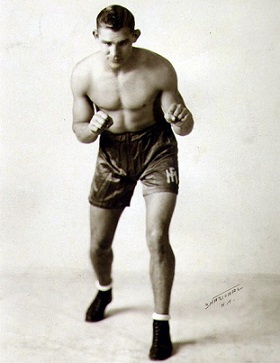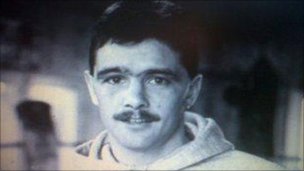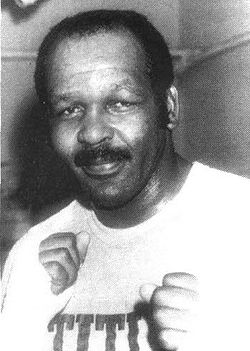Related Research Articles

Freddie Welsh was a Welsh World lightweight boxing champion. Born in Pontypridd, Wales, he was nicknamed the "Welsh Wizard". Brought up in a tough mining community, Welsh left a working-class background to make a name for himself in America. He turned professional as a boxer in Philadelphia in 1905, and spent the best part of his career fighting in the United States.

James Driscoll, commonly known as Peerless Jim, was a Welsh boxer who learned his trade in the boxing ring and used it to fight his way out of poverty. Driscoll was British featherweight champion and won the coveted Lonsdale belt in 1910. He is a member of the Welsh Sports Hall of Fame, the Ring Magazine Hall of Fame, and the International Boxing Hall of Fame.
Nicky Piper MBE is a retired Welsh super middleweight and light heavyweight boxer from Culverhouse Cross, Cardiff. His career was at its peak in the 1990s; he became the Commonwealth Light-heavyweight champion in 1995. He was trained by Charlie Pearson and managed by Frank Warren. Since retiring from boxing, Piper has become a notable administrator in British boxing and currently works for The City Hospice as their Corporate Partnerships Manager.
John Charles Peterson OBE TD was a Welsh boxer who held the British heavyweight boxing title on two occasions. He was awarded the Territorial Decoration (TD) in 1950 and appointed Officer of the Order of the British Empire (OBE) in the 1978 Birthday Honours "for services to Sport particularly in Wales."

Joseph William Calzaghe is a Welsh former professional boxer who competed from 1993 to 2008. He held world championships in two weight classes, including the unified WBA (Undisputed), WBC, IBF, WBO, Ring magazine and lineal super-middleweight titles, and the Ring light-heavyweight title.

John Michael Basham was a Welsh boxer who became British and European champion at both welter and middleweight. His professional career spanned over 20 years, from 1909 to 1929, and after being stationed in Wrexham through military service, he fought most of his bouts in nearby Liverpool.

Llewellyn "Llew" Edwards was a Welsh boxer who fought professionally between 1913 and 1922. He is most noted for winning both the British and the British Empire featherweight boxing titles in 1915 and for an outstanding winning record with a nearly 50% knockout ratio. He took the Australian lightweight title against Herb McCoy in 1916.

Frank Moody was a Welsh boxer who fought between 1914 and 1936. He is most notable for winning the British and Empire middleweight boxing championship in 1927 and 1928 and the light-heavyweight title from 1927 to 1929.
Boxing is a popular sport in Wales, and since the early 20th century Wales has produced a notable number of professional boxers including several World Champions. The most notable boxers include Wales' first World Champion Percy Jones; Jimmy Wilde, who is seen as pound-for-pound one of the World's finest boxers and Joe Calzaghe, who ended his career an undefeated World Champion.
Pat Thomas was a Light-middleweight boxer, originally from Saint Kitts and Nevis, who took British citizenship and won two British boxing titles in the 1970s and 80s. After leaving Saint Kitts, Thomas settled in Cardiff in Wales, and is recognised as a Welsh fighter taking the Welsh light middleweight Championship in 1977.

Robert Dickie was a Welsh professional boxer, fighting at both featherweight and super-featherweight. He was Scottish champion at featherweight, British champion at both weights and became WBC International super-featherweight champion in 1988. He is one of only four Welshmen to hold a British boxing title at different weights, the others being Johnny Basham, Pat Thomas and Jack Petersen.

Thomas Glanville Davies was a Welsh Middleweight boxer. Davies was Wales middleweight champion from 1943 until his retirement in 1949. He successfully defended his title on four occasions. Davies was considered a serious contender for the British Middleweight title, but a string of three fights against Vince Hawkins during 1944 robbed him of his chance of a title fight.
Barry Jones is a Welsh former boxer. He won the WBO super featherweight championship in 1997, but was stripped of the title when his license was revoked by the British Boxing Board of Control after an anomaly was discovered during a brain scan.

Neville Meade was a British boxer from Swansea. Born in Montserrat, he moved to Wales at the age of nine. He rose to prominence when he won the gold medal in the heavyweight division at the 1974 Commonwealth Games in New Zealand. He turned professional in 1974 and won the Welsh Heavyweight title in 1976 and then followed this with the British title in 1981. He retired in 1983 after a failed defence of his British title.
Redvers Sangoe was a Welsh light heavyweight boxer. Based in Tiger Bay in Cardiff, Sangoe's professional career spanned from 1956 to 1960 and he held the Welsh light heavyweight title from 1958 to 1960, successfully defending it on two occasions. In 1964 Sangoe was involved in a street brawl and died from a stab wound sustained in the encounter.

Phineas Gladney John (1910–1985) was a Welsh professional boxer who fought from 1927 and 1940. John ended his career as a featherweight, but in his early professional bouts, he fought as a flyweight before increasing to bantamweight. Soon after he turned professional John competed for area titles, taking the Welsh flyweight belt in 1928 and then the Welsh bantamweight in 1929. After 1929 John failed to pursue any further titles, but continued fighting across the United Kingdom, ending his career with at least 242 professional fights.
Dennis Avoth is a retired Egypt-born heavyweight boxer. Avoth was a promising amateur boxer who turned professional in 1967. He held the Welsh Heavyweight Championship title from 1971 to 1973. He is the brother of Eddie Avoth, who was also a boxer and who became British, and Commonwealth Light-heavyweight champion, and European Light-heavyweight challenger.
Wayne Ellis was a Middleweight boxer. A promising amateur he turned professional in 1988 and won the Wales Middleweight belt in 1992.

Fred Dyer born Frederick William O'Dwyer, was a Welsh boxing champion, boxing manager and baritone singer. Trained by vocal teacher Clara Novello Davies, Dyer was famed for singing to audiences after he had fought in a contest and was nicknamed 'The Singing Boxer'.
Johnny Houlston (1917–1962) was a Welsh welterweight and middleweight boxer. Houlston was Wales welterweight champion from 1938 until he relinquished the belt with the outbreak of the Second World War in 1939. Houlston decision to join the Merchant Navy in 1939 resulted in him engaging in no professional bouts until he left the service in 1946. On his return to professional boxing after the war, Houlston switched to middleweight and made one unsuccessful attempt at the Welsh title. His boxing career lasted from 1935 to 1949. He was predicted to be a World Middleweight Champion before the war.